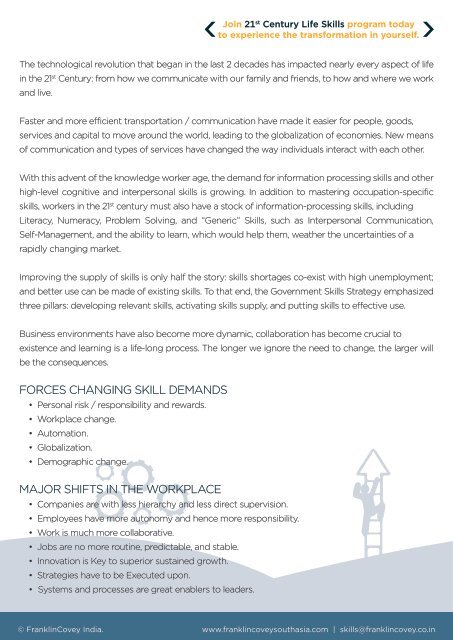21st-Century-Life-Skills
21st-Century-Life-Skills
21st-Century-Life-Skills
- No tags were found...
You also want an ePaper? Increase the reach of your titles
YUMPU automatically turns print PDFs into web optimized ePapers that Google loves.
Join 21 st <strong>Century</strong> <strong>Life</strong> <strong>Skills</strong> program todayto experience the transformation in yourself.The technological revolution that began in the last 2 decades has impacted nearly every aspect of lifein the 21 st <strong>Century</strong>: from how we communicate with our family and friends, to how and where we workand live.Faster and more efficient transportation / communication have made it easier for people, goods,services and capital to move around the world, leading to the globalization of economies. New meansof communication and types of services have changed the way individuals interact with each other.With this advent of the knowledge worker age, the demand for information processing skills and otherhigh-level cognitive and interpersonal skills is growing. In addition to mastering occupation-specificskills, workers in the 21 st century must also have a stock of information-processing skills, includingLiteracy, Numeracy, Problem Solving, and “Generic” <strong>Skills</strong>, such as Interpersonal Communication,Self-Management, and the ability to learn, which would help them, weather the uncertainties of arapidly changing market.Improving the supply of skills is only half the story: skills shortages co-exist with high unemployment;and better use can be made of existing skills. To that end, the Government <strong>Skills</strong> Strategy emphasizedthree pillars: developing relevant skills, activating skills supply, and putting skills to effective use.Business environments have also become more dynamic, collaboration has become crucial toexistence and learning is a life-long process. The longer we ignore the need to change, the larger willbe the consequences.FORCES CHANGING SKILL DEMANDS• Personal risk / responsibility and rewards.• Workplace change.• Automation.• Globalization.• Demographic change.MAJOR SHIFTS IN THE WORKPLACE• Companies are with less hierarchy and less direct supervision.• Employees have more autonomy and hence more responsibility.• Work is much more collaborative.• Jobs are no more routine, predictable, and stable.• Innovation is Key to superior sustained growth.• Strategies have to be Executed upon.• Systems and processes are great enablers to leaders.© FranklinCovey India.www.franklincoveysouthasia.com | skills@franklincovey.co.in


